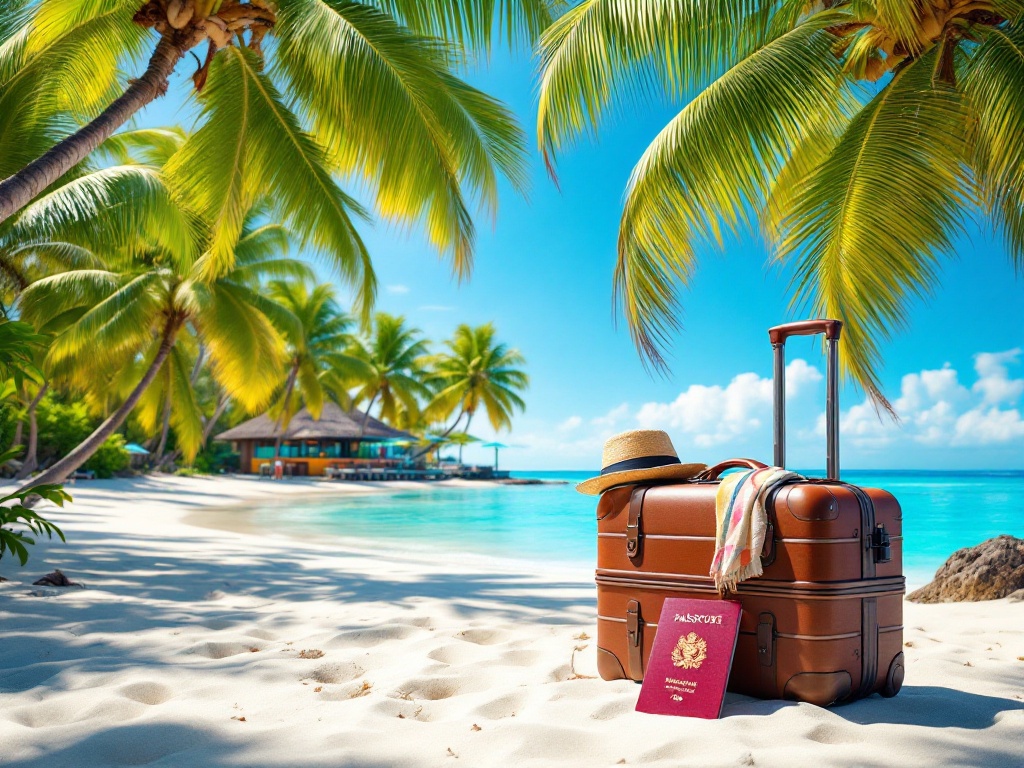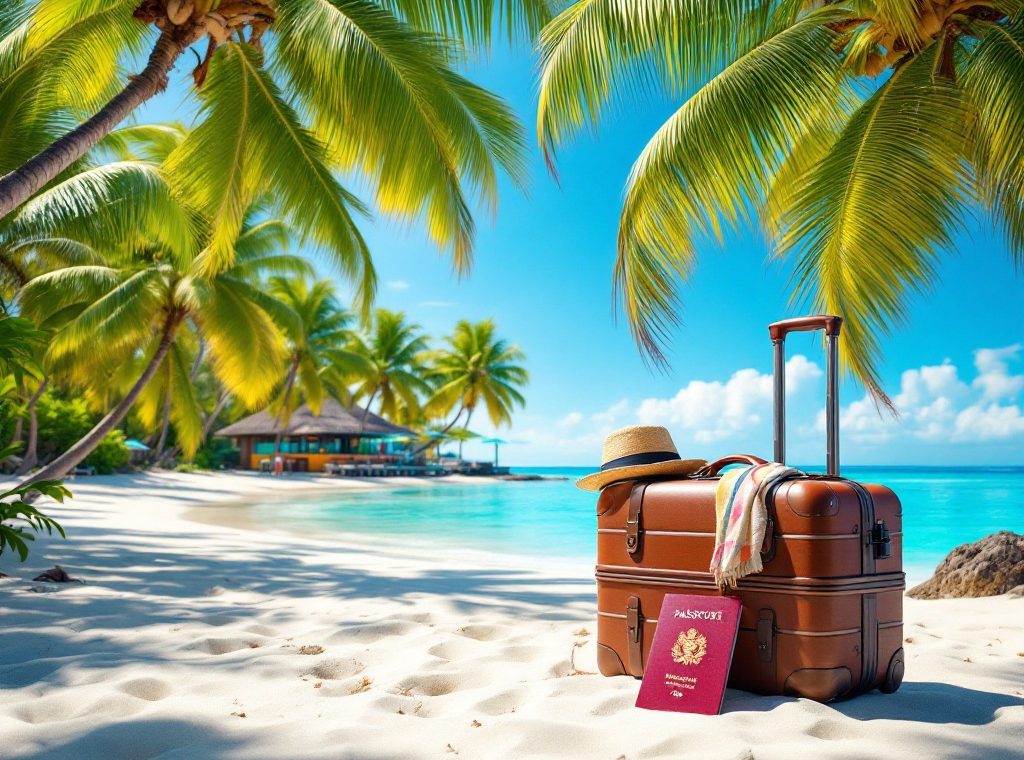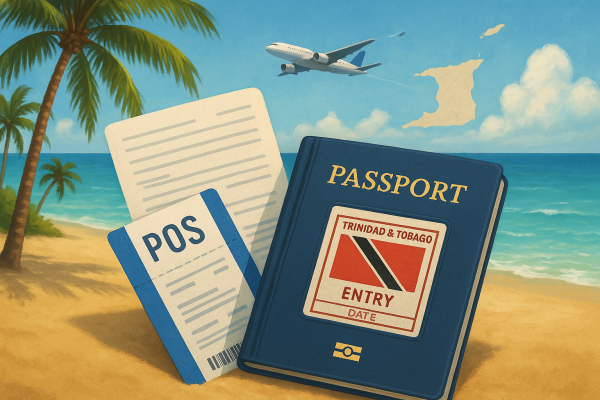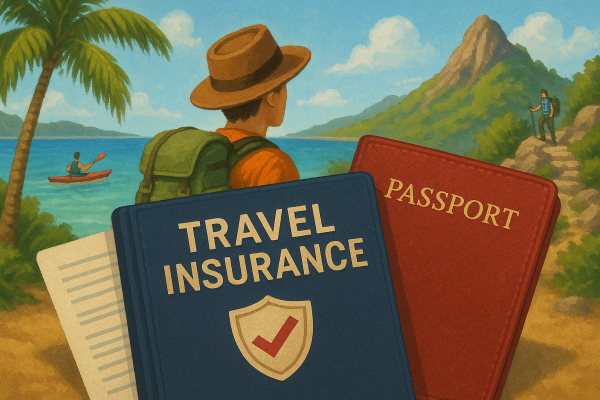Strict Caribbean Travel Regulations: Navigating Entry Requirements
Dreaming of a Caribbean escape? Island hopping is back, but navigating entry rules can be tricky. This guide simplifies the process, outlining current travel regulations for popular destinations like the Bahamas, Barbados, and Turks and Caicos. Learn about essential documents, COVID-19 testing requirements, and health protocols. Ensure a smooth journey to paradise. Start planning your worry-free Caribbean adventure today!
Important information

- A valid passport is essential for all Caribbean destinations, and it must be valid for at least six months beyond your return date.
- Entry requirements vary by island and change frequently. Always check the official government website of your specific destination for the most up-to-date information before traveling.
- Many islands have COVID-19 protocols, such as negative PCR tests, vaccination proof, health declaration forms, and possible quarantine requirements.
- Some destinations require pre-arrival registration or online passenger declarations. Check specific island requirements for any necessary forms like the C5 form.
- Supporting documents such as proof of onward travel (return ticket), travel insurance, and hotel confirmations are recommended and may expedite the immigration process.
Strict Caribbean Travel Regulations Explained
As COVID-19 restrictions ease, Caribbean destinations are reopening, though safety measures remain in place. Each country has unique and evolving protocols, so checking official government websites for the latest information before your trip is essential. For specific entry requirements, research destinations such as:
- Anguilla,
- Antigua and Barbuda,
- The Bahamas,
- Barbados,
- Grenada,
- Saint Vincent and the Grenadines,
- Turks and Caicos.
Careful planning and staying informed will ensure a smoother travel experience.
What Are the Entry Requirements for Caribbean Countries?
Planning a Caribbean getaway? Entry requirements vary by island, so it’s crucial to be prepared. A valid passport is essential for all travelers. You might also need proof of onward travel, such as a return ticket or itinerary. Some destinations require a visa depending on your nationality. Many Caribbean nations also have COVID-19 protocols in place. These may include proof of vaccination, a negative test, or other health documentation. Remember, these rules can change frequently, so check your specific island’s entry requirements shortly before your departure. Be sure to confirm the latest travel advisories and restrictions to ensure a smooth trip to paradise.
How Travel Regulations Affect Tourist Entry
Travel regulations often impact tourists, requiring tests and sometimes quarantines to protect public health while still permitting travel. Because these rules can change rapidly, with countries potentially adding new testing requirements or varying quarantine guidelines, consulting official government websites for the latest information before your trip is crucial for a safe and informed journey.
Essential Travel Documents for Entry
Planning your Caribbean escape? A valid passport is essential, along with a return or onward ticket. Each island nation has its own entry requirements, so research is key. While not always mandatory, proof of funds, travel insurance, and hotel confirmations can expedite immigration. Some countries may also require a visa or tourist card. Your passport must be valid for at least six months after your return date. Double-check that expiration date! Consult official government websites for the most up-to-date information on visas and entry protocols.
Secure a valid passport. It’s the most crucial document for international travel.
Book your return or onward ticket. This confirms your departure plans.
Research the specific entry requirements for your chosen island nation. Each country has its own rules.
Prepare supporting documents. While not always mandatory, having proof of funds, travel insurance, and hotel confirmations can smooth the immigration process.
Check visa and tourist card requirements. Some Caribbean countries may require these for entry.
Ensure your passport’s validity extends at least six months beyond your return date. Double-checking this is essential.
Consult official government websites. They provide the most current information on visas and entry protocols.
What Travelers Need: Valid Passport and More
Traveling to the Caribbean? Ensure your passport is valid for at least six months. While U.S. and Canadian citizens might enter some islands (like Jamaica) with enhanced driver’s licenses or tribal IDs, a passport is generally recommended. You’ll need a return or onward ticket. Having travel insurance, hotel reservations, and proof of funds can speed up immigration. Arriving by land or sea may offer other ID options, like passport cards.
Travel Authorization and Documentation
Before your trip, take these steps:
Confirm your passport’s validity. It needs to be valid for your travel dates.
Check if you need travel authorization. Depending on your destination, a visa or other permit might be required.
Research your destination’s entry requirements. Check the specific rules and regulations well in advance.
Health and Safety Protocols for Travelers
Planning a Caribbean getaway? Prioritize your health and safety by checking each island’s specific entry requirements. Many islands mandate a negative COVID-19 test. You’ll likely encounter temperature checks at airports and need to complete a health declaration form. Some destinations require a health pass verifying vaccination status or recent recovery. For the most up-to-date information, consult the official government website of your destination. Each nation has unique protocols based on individual COVID-19 risk assessments. A negative PCR test often serves as your key to entry, minimizing viral spread. The health declaration form provides crucial health information, enabling officials to track and manage potential risks. Temperature screenings offer a quick initial health check, while a health pass provides added assurance by confirming your protected status.
Entry Requirements
- Negative COVID-19 test result,
- temperature checks at airports,
- completed health declaration form.
Health Pass
Some destinations require a health pass verifying vaccination status or recent recovery from the virus.
For the most up-to-date information, consult the official government website of your destination.
Importance of a Negative PCR Test and Health Declaration
A negative PCR test confirms that a traveler is COVID-free, minimizing the risk of viral spread. A health declaration discloses potential exposure or symptoms, enabling swift action if necessary. These measures safeguard everyone’s health and safety, protecting both residents and visitors in the Caribbean.
Temperature Screenings and Health Pass Requirements
Some Caribbean countries may check your temperature upon arrival. Several nations, such as The Bahamas, also require a health pass. This pass verifies your health status, including proof of a negative COVID-19 test and a completed Health Visa. These precautions promote safe travels throughout the region.
Travel by Air: Key Considerations
Planning a Caribbean getaway? Many islands now require visitors to pre-register with an online passenger declaration. Be sure to check your specific destination’s requirements, as you’ll likely need to complete an online form with your personal information. For the most accurate details, consult the official government website or contact the relevant embassy or consulate. This pre-registration expedites the immigration process, ensuring a smoother arrival experience.
Pre-Arrival Registration and Online Passenger Declaration
Some Caribbean islands require visitors to pre-register by completing an online passenger declaration form. This process expedites arrival and confirms adherence to entry requirements. Be sure to check your destination’s specific rules for a smoother trip.
Immigration and Customs: Required Forms
Caribbean travel requires careful planning, especially regarding entry requirements and flight procedures. Remember to complete the C5 passenger information form, detailing your trip’s purpose and duration. Pilots should be aware of customs and immigration procedures at each island, which may require up to 24 hours’ notice. While flight plans are compulsory and GPS is recommended, navigational aids can be unreliable. Each Caribbean nation has its own unique entry rules, so it’s crucial to check these before your departure.
Completing the C5 Form for Caribbean Travel
Planning a Caribbean getaway to islands like Jamaica? You’ll need to complete the online C5 passenger declaration form before you arrive. This digital form streamlines the immigration process, allowing for a quicker entry experience. Complete it in advance to simplify your arrival.
Understanding the Immigration/Customs Form
Immigration and customs forms are essential for legal entry into Caribbean countries, providing authorities with crucial traveler information and visitor statistics. However, the specific forms vary by country. For precise requirements, consult the destination country’s official government website to ensure a smooth arrival. Some countries may require a customs declaration, while others might ask for a separate embarkation/disembarkation card.
Country-Specific Entry Guidelines
Planning your Caribbean getaway? Island entry requirements vary, so research is key. A valid passport and proof of onward travel are essential. Some islands, like Anguilla, may require a visa. Health protocols also differ. Antigua and Barbuda may require a negative COVID-19 test or proof of vaccination. Barbados may recommend specific testing. Grenada and the Bahamas have unique COVID-19 entry procedures. The Bahamas often requests advance arrival notice. Saint Vincent and the Grenadines requires a pre-arrival form. A negative COVID-19 test is mandatory for Turks and Caicos. For pilots, navigating diverse customs and immigration adds complexity. Flight plans and GPS are often essential due to inconsistencies in navigational aids. Thorough preparation ensures smooth Caribbean travels.
Entry Requirements
- valid passport,
- proof of onward travel,
- visa (for some islands like Anguilla).
Health Protocols
- Antigua and Barbuda: Negative COVID-19 test or vaccination proof,
- Barbados: Specific testing may be recommended,
- Grenada and the Bahamas: Unique COVID-19 entry procedures,
- Saint Vincent and the Grenadines: Pre-arrival form required,
- Turks and Caicos: Negative COVID-19 test mandatory.
For pilots, inconsistencies in navigational aids necessitate reliance on flight plans and GPS. Each island presents unique customs and immigration processes.
Anguilla: Entry Rules and Protocols
Anguilla, currently COVID-19 free, reopened its borders on August 21. While the island welcomes visitors, travelers must adhere to certain protocols.
Complete the entry form.
Provide a negative COVID-19 PCR test taken three to five days prior to arrival.
Secure health insurance covering COVID-19 related medical expenses.
Undergo testing upon arrival.
Take a second test 10 days later.
Antigua and Barbuda: Testing and Regulations
Traveling to Antigua and Barbuda requires a few steps. First, obtain a negative COVID-19 RT-PCR test taken within seven days of your departure. Second, complete a health declaration form. Finally, be aware that health officials may monitor you for up to two weeks upon arrival.
The Bahamas: Updated Travel Regulations
Planning your Bahamian getaway is now easier. While a negative COVID-19 test is required, there’s no quarantine. Start your travel planning today.
Barbados: Testing Recommendations
Plan a safe trip to Barbados by following these steps:
Take a COVID-19 PCR test within 72 hours of your departure. This is especially important if you are traveling from a high-risk country.
Ensure you receive a negative test result, as it is required for entry.
Practice social distancing and wear a face mask at the airport. This will help protect yourself and your fellow travelers.
Grenada: COVID-19 Protocols
Traveling to Grenada? Here’s what you need to know:
Negative PCR Test: present a negative PCR test taken within seven days of your travel.
Approved Accommodations: reserve your stay at pre-approved accommodations.
Quarantine: be prepared for potential quarantine requirements upon arrival.
Second Test: a second PCR test may be required on day four of your stay.
Safety Measures: face masks and social distancing are mandatory in public areas.
Saint Vincent and the Grenadines: Pre-Arrival Form Requirements
Travelers to Saint Vincent and the Grenadines are now required to complete a pre-arrival form. This requirement began on August 1st with the reopening of the country’s borders.
Turks and Caicos: Negative Test Requirement
A negative COVID-19 PCR test is required for entry to Turks and Caicos. This test must be taken within a specified timeframe before your arrival. The islands reopened their borders on July 22.
















